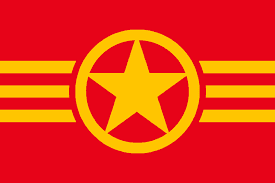What if the Soviets won the cold war: Part Three, A new Chairman, a stronger Union
After fierce deliberation, the Supreme Soviet decided upon Georgy Malenkov to replace Ioseph Stalin. This choice fiercely upset the Western allies, as Malenkov was just as militaristic as Stalin. The new Eisenhower administration held the first peace discussion in the cold war, the talks, however, didn't go anywhere. Malenkov and Eisenhower both wanted to get rid of nuclear weapons, but neither one initially wanted to start the program.
The pan-Arab movement resulted in a new republic in 1956, that of the pan-Arab union, a combination of Syria and Egypt. This new nation was a revolutionary socialist state and would ensure the USSR and its allies a steady supply of oil. This angered the Americans immensely, which tried a coup against Al Farouk, its leader. This went nowhere, and he gave the Eisenhower administration an ultimatum, apologize (with monetary concessions), or the new union would join the Warsaw pact. Eisenhower allied, and the new union, now emboldened, declared war on the new nation (and American ally) Isreal. The USA, understanding this war was not their place, backed away, leading to a pan-Arab victory in 4 months and 15 days. They annexed all of the Levant, and the nations of Jordan and Lebanon would join the new state on April 4th, 1956, and June 23rd, 1956.
In the election of 1956, the liberal Adalai Stevenson won, beating out Eisenhower due to the failures in the middle east, and the economic crisis of 1956, resulting in high national debt and q rising inflation. The new Stevenson administration focused on diplomacy rather than strength, citing the importance of peace. This lead to a strong counter-culture movement in the United States, as a way for teens to rebel against the radical Christian conservative culture at the time. These new children were anti-religion, anti-America, and pro-soviet.
With the launch of Sputnik 1 in 1958, the Soviet Union entered a new challenge to try and crush American will, the space race. Sputnik was the first man-made object to enter Earth's atmosphere, and by launching Sputnik, the CCCP showed to the west that they could send missiles through Earth's atmosphere. The United States immediately announced its new space agency, NASA.
The Soviet Union, with the major moral boost of Sputnik, announced a brand new 5-year plan, that would build more industry, strengthen their most outdated fleet, and build a railway from Paris to Beijing, connecting the socialist world. The plan, whilst ambitious, would compete for many of the goals set out by Stalin in the later years of his rule, including better and more energy, a larger fleet, and a modern railway network. The program would also send money and development to allies across the Soviet spheres of influence, including Japan, China, Hindustan, Korea, Indochina, and the pan-Arab union, resulting in more loyalty for these regions.
With the dawn of the new year, Fidel Castro, a Marxist, succeeded with a total Communist victory in Cuba. This new Cuban Peoples Republic was a strong USSR ally, and there were talks with Moscow about formalizing this alliance, but these talks wouldn't amount to anything until Cuba was finally defended from Washington.
On June 8th, 1959, the Soviets sent the first man to space, Yuri Gagarin. One month later, the USA would send its first spacecraft into space. As the years moved on, both sides realized the final goal of this race, a military base on the Moon. The soviets spent an astronomical ₽600 billion on their manned moon landing program.
In January 1961, the North Indochinese Government declared war on their southern counterpart. The American government, citing the violation of the treaty of Singapore, declared war on February 8th, with 60,000 troops being sent to Hanoi for a total invasion. The English however, who had also signed the treaty, had declined the Americans plea. The war was a disaster for the south, as the American air force and tank corps were virtually useless in the dense jungle. When Stevenson called for more troops, congress declined, citing the skirmishes in Persia and the unpopularity of the ongoing draft.
In October 1962, the South Indochinese government collapsed, with the Viet Minh capturing Saigon and storming the American embassy. The treaty of Ho Chi Minh city was signed on October 21st, resulting in the unification of Indochina. The recent failure in Indochina terrified an already unpopular Stevenson, who had to worry about an election the following month. This was made far worse with the New York massacre, a peaceful protest in Time Square put down with a squadron of riot police firing into the crowd. Thirty-two civilians died, and an official statement was made by the mayor, Jhon Linsey. These crises lead to the Republican Richard Nixon winning the 1962 election.



Comments
Post a Comment